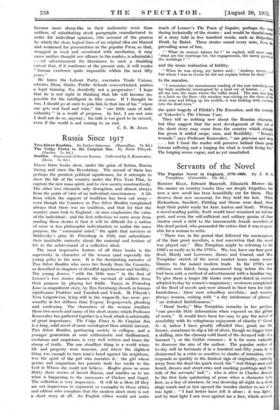Russia Since 1917
Bonfire. Stories out of Soviet Russia. Collected by S. Konovalov. (Benn. 7s. 6d.) Bonfire. Stories out of Soviet Russia. Collected by S. Konovalov. (Benn. 7s. 6d.) THESE three books show, under the guise of fiction, Russia during and since the Revolution. The second of them has perhaps the greatest political significance, for it attempts to show the life of the country under the Five Year Plan, to capture the new mass spirit, and to view society constructively.
The other two chronicle only disruption, and almost always from the point of view of an individual consciousness. A life from which the support of tradition has been cut away— even though the Countess in Two Silver Roubles complained always that there was no tradition, and that for that the country must look to England—at once emphasizes the value of the individual : and the first reflection we carry away from reading these stories is that it will be difficult for a nation of more or less philosophic individualists to realize the mass purpose, the " communal mind," the spirit that survives in Shklovsky's grim St. Petersburg in 1920, and subordinate their insatiable curiosity about the material and texture of life to the achievement of a collective ideal.
The most impressive feature of all three books is the superiority in character of the women (and especially the young girls) to the men. It is the dominating narrator of Two Silver Roubles who saves her family from the Cossacks, as described in chapters of dreadful apprehension and lucidity. The young Jewess " with the little nose " in the first of Leonov's two stories shames the car-load of soldiers from their purpose by playing her fiddle. Tanya in Protochny Lane (a magnificent story, by Ilya Erenburg) dwarfs in human significance Prakhov and Yanshek and Yuzik. M. Pilnyak's Vera Grigorievna, lying still in the wagon-lit, has more per- sonality in her stillness than Evgeny Evgenyevich, pleading and confessing. The characters of the women irradiate these two novels and many of the short stories which Professor Konovalov has gathered together in a book which is artistically of great importance. The Volga Flows to the Caspian Sea is a long, solid novel of more sociological than artistic interest. Two Silver Roubles, portraying society in collapse, and a younger generation at once enthusiastic and disillusioned, credulous and suspicious, is very well written and bears the stamp of truth. The one steadfast thing in a world where life and property were insecure, and where the slightest thing was enough to turn man's hand against his neighbour, was the spirit of the girl who narrates it : the girl whose genius and magnetism her parents bade her credit to the God in Whom she could not believe. Pcmfire gives us some thirty short stories of Soviet Russia, and enables us to see what is happening to the successors of Chekov and Gogol. The collection is very impressive. It will be a blow (if they are not impervious to argument or example) to those critics and editors who complain that the modern short story is not is short story at all. An English editor would not make much of Leonov's The Town of Gogulev, perhaps the n daring technically of the stories : and would be dumbfounds( at a story told in five hundred words, such as Dolgushoes Death, by Babel. These stories sound every note, from ist prevailing sense of loss, " ' What do women labour for ? ' he replied, still more sacii, ' what are the courtings for, the engagements, the merry guests ; the weddings ? ' " and the ironic realization of futility, " When he was dying, my father said : Andrey, revere id but whom I was to revere he did not explain before he died."
to the macabre, " I remember the monotonous reading of the nun watching (my his body suddenly interrupted by a loud cry of horror. .
all ran into the room where the coffin stood. The nun was lying in a faint on the floor—the monkey was sitting on the cheat of the dead man and lifting up his eyelids, it was looking with curiosity into the dead eyes," the quiet tragedy of Fibikh's The Execution, and the comedy of Yakovlev's The Chinese Vase.
They tell us nothing new about the Russian character, but they suggest that the next development of the art of the short story may come from the country which already has given it added scope, ease, and flexibility. " Russia's wounds," says Professor Konovalov, " are grievous and deep . . . but I trust the reader will perceive behind them great human suffering and a longing for what is worth living for...! The longing seems vague, and as yet unsatisfied.






























 Previous page
Previous page